Chapter IV: Yellowstone
of Travels with Samantha by Philip Greenspun
Saturday, June 5
William Bradford described Massachusetts as a "howling wilderness," but
that is only because he hadn't visited the Dakotas or eastern Montana.
The weather forecast described the 20-30 mph winds as "light." If
anyone wants to spend our tax dollars to build a few mountain ranges
between the Dakotas and Canada, they'll get no argument from me.
Downtown
Bismarck
is a compact affair of low-rise functional buildings
and one-way streets. I found the YMCA open but the swimming pool
closed, so I exercised the desk clerk in finding me a phone jack with
which I could connect to America OnLine. There was precious little
email, and people whom I'd contacted by telephone said they'd never
received the messages I sent. It seemed incredible that a commercial
network, equipped with the very latest in hardware and software, could
be less reliable than the 25-year-old Internet, which I'd used for 15
years without problems. Furthermore, America OnLine denied that there
had ever been anything wrong with their service. Nonetheless, I was
becoming convinced that messages were being dropped, vanishing into
thin air, something that was theoretically impossible with modern
networking protocols. My screams of frustration attracted Steve, a
local Lutheran pastor.
"What I can't believe is how America can't engineer a better snack
machine," Steve noted, pointing to a massive screw-drive machine in the
corner.
"Would you expect better given the paltry salaries engineers are paid?"
I asked. "Why would an intelligent person choose to be an engineer
rather than a doctor, lawyer, or MBA?" This attracted a few teenage Y
employees.
"I can't have any sympathy for people who make $50,000/year," Steve
said. "Show me someone else who has a master's degree and earns
$12,000/year."
I raised my hand.
After swimming a mile, I strolled out past a couple of little girls
alone in the lobby. They said goodbye to me and it stunned me. I'd
never had to learn to talk with children because East Coast families so
carefully school their kids not to talk with strangers.
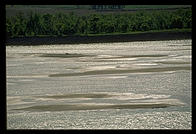 I was just getting to like Bismarck when it was time to leave to follow the
trail of Lewis and Clark (1806) up the Missouri River's mini-canyon on
the Great Plains.
With the right light, the grasslands and hills are haunting, and even
passing coal mines and power plants were surprisingly clean and appealing.
The Missouri is the boundary between the flat eastern half of the state
and the hilly western half. Bob, a weathered Pentecostal auctioneer,
explained this to me: "The Wisconsin Ice scraped over only the eastern
half of North Dakota. The Missouri River was actually formed by water
melting off the top of the glacier and hence gives a good indication of
the extent of the ice sheet."
I was just getting to like Bismarck when it was time to leave to follow the
trail of Lewis and Clark (1806) up the Missouri River's mini-canyon on
the Great Plains.
With the right light, the grasslands and hills are haunting, and even
passing coal mines and power plants were surprisingly clean and appealing.
The Missouri is the boundary between the flat eastern half of the state
and the hilly western half. Bob, a weathered Pentecostal auctioneer,
explained this to me: "The Wisconsin Ice scraped over only the eastern
half of North Dakota. The Missouri River was actually formed by water
melting off the top of the glacier and hence gives a good indication of
the extent of the ice sheet."
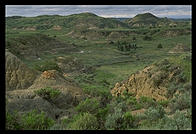 Despite torrential rain, I breezed west on I-94 to Theodore Roosevelt National Park in the North Dakota Badlands,
which are similar to but much less touristed than their South Dakota
cousins. The interplay of clouds and solid rays of fading sunlight at
the Painted Canyon overlook was the stuff of photographers' dreams.
By the time I hauled out my 50 lb. medium format camera and tripod,
the clouds achieved ascendancy and banished the magic.
Despite torrential rain, I breezed west on I-94 to Theodore Roosevelt National Park in the North Dakota Badlands,
which are similar to but much less touristed than their South Dakota
cousins. The interplay of clouds and solid rays of fading sunlight at
the Painted Canyon overlook was the stuff of photographers' dreams.
By the time I hauled out my 50 lb. medium format camera and tripod,
the clouds achieved ascendancy and banished the magic.
I camped in the national park, which was rather quiet compared with the
biker convention the night before. A car pulled up next to me and a
16-year-old girl got out of the car clutching a doll. She stared
straight at me, and I jokingly said, "Nice doll." The words had barely
escaped my mouth before I realized that she was not fully developed
mentally and there is a virtue in keeping one's mouth shut. I spent the
evening talking with Amber and her parents.
"She loves Little House on the Prairie and reads it over and over
again. We drove here from Michigan and stopped in Minnesota to visit
the actual house. Amber is just a delight to travel with; she's never
had a mean thought about anyone."
I'd never understood what parents meant when they said they were just as
happy with their handicapped children as with their normal children.
Why weren't they angry with God for burdening them? Amber was the first
mentally handicapped child I'd spent any time with, and the evening made
it obvious that one could very easily love such a child just as much, if
not more.
Sunday, June 6
After a quick tour round the national park under the cloudy skies that
had dogged me since Vermont, I drove west to
Billings,
Montana.
Montana is where General Custer made his ill-fated 1876 last stand against
Cheyenne Indians brazen enough to insist on their treaty rights.
Two
clerks at the downtown Sheraton, which soars an incongruous 23 stories
above the flat town, gave me an education on modern white/Indian dynamics.
"I grew up speaking only English because even my parents can't speak
Cheyenne. They went to a Catholic school growing up and would get
beaten if caught speaking it. The priests didn't want students talking
behind their backs," said the Indian desk clerk. "I went to a much
better school than they did. It was massively funded by the federal
government, and we had equipment that most schools couldn't even imagine.
The only problem was that it was an hour and a half bus ride each
way."
How could he think if he spent three hours a day on a noisy school bus?
"Noisy? You don't understand. This was the nicest coach you've ever
seen. Big, quiet, with TVs and radios behind all the seats."
Rand McNally calls Route 212 the most scenic road in America. On the
map it is the most direct route from Billings to Yellowstone, but
crossing 11,000' high Beartooth Pass complicates matters.
I stopped
at a gas station convenience store in
Red Lodge,
the last town before
the pass.
"You'd better call the sheriff's department to find out if the pass is
open. It was closed earlier in the day, and it is already 6:30. You
don't want to be caught up there overnight, believe me," said the
cashier.
Although there was a pay phone just outside and I hadn't bought
anything, when I asked for the number she dialed it for me and handed me
the phone. The prognosis was iffy so I pressed on up the mountain under
gray skies shedding a slight rain.
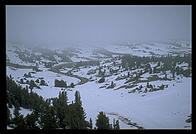 The road quickly became tortuously twisty, and the shoulder disappeared
to be replaced by jagged, threatening, overhanging rock. Then the
real fun started: I arrived in the clouds at about 7,000' and ducked
in and out of the mist, passing 8' snow drifts and enormous frozen
lakes (remember this is June). After about an hour I began to
appreciate the desolate moonscape of pine trees sticking out from the
snow, but the strain of driving three hours under these conditions
made me happy to arrive at Roosevelt Lodge in the northeast corner of
the park.
The road quickly became tortuously twisty, and the shoulder disappeared
to be replaced by jagged, threatening, overhanging rock. Then the
real fun started: I arrived in the clouds at about 7,000' and ducked
in and out of the mist, passing 8' snow drifts and enormous frozen
lakes (remember this is June). After about an hour I began to
appreciate the desolate moonscape of pine trees sticking out from the
snow, but the strain of driving three hours under these conditions
made me happy to arrive at Roosevelt Lodge in the northeast corner of
the park.
June 7
Cold torrential rain poured down and the power failed during breakfast.
I curled up with Samantha next to the lodge's fireplace and wrote some
Common Lisp code for a research project at MIT. After a couple of
hours, it was still raining, but my Puritan work ethic had dissipated; I
pulled out The Joy Luck Club and listened to Randy, a rugged
flannel-shirt-and-boots guy, play Joplin rags on the upright.
"I came here 14 years ago and fell in love with Yellowstone. I didn't
go to college so that I could be a reservations agent for TW Services
[they manage the park's lodges], but I never want to leave."
What did his family think of his choice?
"They can't understand why anyone would choose poverty and isolation.
My brother, whom I'd not seen for eight years, and his wife and kid came
to visit me not long ago. They could only find enough activities to
interest them for a day and a half."
What about women?
"Nothing going. I'm kind of a loner."
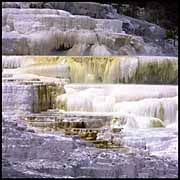 I drove over to
Mammoth Hot Springs
and walked among the fabulous
terraces, residues of various minerals bubbling up with the water.
Each terrace forms the rim of a limpid blue hot pool. My memory of
them was gleaming white with occasional streaks of bright blues,
yellows, and reds, but everything today looked about as grey as the
sky. The rain restrained itself while I had a long conversation with
an elegant Parisian couple who spoke virtually no English. Madame
peppered me with questions about the best way to see the foliage of
New England while Monsieur urged her to slow down her rapid-fire
French.
I drove over to
Mammoth Hot Springs
and walked among the fabulous
terraces, residues of various minerals bubbling up with the water.
Each terrace forms the rim of a limpid blue hot pool. My memory of
them was gleaming white with occasional streaks of bright blues,
yellows, and reds, but everything today looked about as grey as the
sky. The rain restrained itself while I had a long conversation with
an elegant Parisian couple who spoke virtually no English. Madame
peppered me with questions about the best way to see the foliage of
New England while Monsieur urged her to slow down her rapid-fire
French.
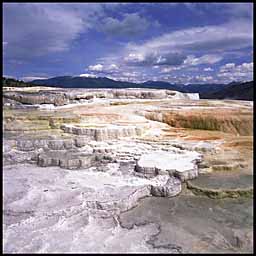
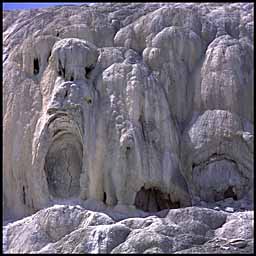
Tuesday, June 8
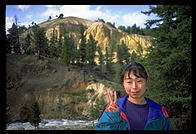 Morning broke a little less miserable than yesterday, and I was
grateful that it wasn't raining or bitter cold. I drove out to Tower
Falls with Hiromi, a girl from Tokyo who'd been going to college in
Colorado for a couple of years. Thomas Moran made Tower Falls famous
on several canvases during his 1874 commission from the U.S. Congress.
In the modern world of TV documentaries, Interstate highways, and frequent
flyer miles, it was a strain to imagine a time when hiring an oil
painter was an essential aid to determining whether the land was worth
making our first national park.
Morning broke a little less miserable than yesterday, and I was
grateful that it wasn't raining or bitter cold. I drove out to Tower
Falls with Hiromi, a girl from Tokyo who'd been going to college in
Colorado for a couple of years. Thomas Moran made Tower Falls famous
on several canvases during his 1874 commission from the U.S. Congress.
In the modern world of TV documentaries, Interstate highways, and frequent
flyer miles, it was a strain to imagine a time when hiring an oil
painter was an essential aid to determining whether the land was worth
making our first national park.
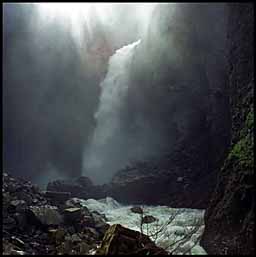 Hiromi was about 5' tall and looked like a sprite tripping down the
trail into the canyon, especially by comparison with my 6' 190 lb.
carcass lumbering down into the canyon after her, propelled by the 50
lbs. of photography gear strapped to my back. When we got to the
bottom, we were entranced by the noise and spectacle of the
snowmelt-engorged torrent plunging 500' off the side of Yellowstone
Canyon. Careful to avoid getting too much spray on my $15,000 Rollei
6008 camera system, I set up my tripod and carefully exposed a few 6x6
cm pictures. My career as a Thomas Moran wanna-be ground to a halt
when the camera battery died and my spare proved to be discharged as
well.
Hiromi was about 5' tall and looked like a sprite tripping down the
trail into the canyon, especially by comparison with my 6' 190 lb.
carcass lumbering down into the canyon after her, propelled by the 50
lbs. of photography gear strapped to my back. When we got to the
bottom, we were entranced by the noise and spectacle of the
snowmelt-engorged torrent plunging 500' off the side of Yellowstone
Canyon. Careful to avoid getting too much spray on my $15,000 Rollei
6008 camera system, I set up my tripod and carefully exposed a few 6x6
cm pictures. My career as a Thomas Moran wanna-be ground to a halt
when the camera battery died and my spare proved to be discharged as
well.
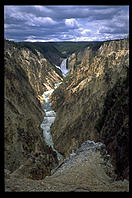
"I looked into a gulf 1700' deep, with eagles and fish-hawks circling
far below. And the sides of that gulf were one wild welter of
colour--crimson, emerald, cobalt, ochre, amber, honey splashed with port
wine, snow-white, vermilion, lemon, and silver-grey, in wide washes.
The sides did not fall sheer, but were graven by time and water and air
into monstrous heads of kings, dead chiefs, men and women of the old
time. So far below that no sound of its strife could reach us, the
Yellowstone River ran--a finger-wide strip of jade-green. The sunlight
took those wondrous walls and gave fresh hues to those that nature had
already laid there. Once I saw dawn break over a lake in Rajputana and
the sun set over the Oodey Sagar amid a circle of Holman Hunt hills.
This time I was watching both performances going on below me--upside
down, you understand--and the colours were real! The canyon was burning
like Troy town; but it would burn forever, and thank goodness, neither
pen nor brush could ever portray its splendours adequately."
--- Rudyard Kipling, 1889
"It is my opinion that we enclose and celebrate the freaks of our nation
and of our civilization. Yellowstone National Park is no more
representative of America than is Disneyland."
--- John Steinbeck, Travels with Charley, 1962
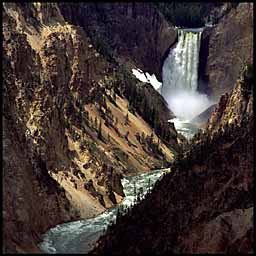 We continued upstream on the rim of Yellowstone Canyon until we came to
the magnificent pair of waterfalls at its front. On my first trip to
the West, I'd found this canyon much more beautiful than the Grand
Canyon and would have described it as Kipling did. Under gray skies, it
was still beautiful, but the magic was gone.
We continued upstream on the rim of Yellowstone Canyon until we came to
the magnificent pair of waterfalls at its front. On my first trip to
the West, I'd found this canyon much more beautiful than the Grand
Canyon and would have described it as Kipling did. Under gray skies, it
was still beautiful, but the magic was gone.
Driving back, we encountered a herd of parked cars. Ten elk dotted both
sides of the highway and 15 tourists exchanged theories.
"It's a female moose."
"Es ist ein Hirsch." (It is a deer.)
"They're elk!"
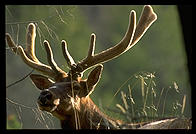 Conversation halted when I pulled out my friend Henry's 300/2.8 lens. This baby comes in its own Nikon suitcase and costs and weighs about as much as a good used car. With the massive sunshade attached, it looks like a bazooka. The bull elks' antlers were covered with fine fuzz that glowed white when backlit by the afternoon sun.
Fujichrome Velvia was pumping through the camera at a prodigious rate
when I remembered Galen Rowell's comment that "there are 100,000 images
of elk in the files of stock agencies worldwide."
Conversation halted when I pulled out my friend Henry's 300/2.8 lens. This baby comes in its own Nikon suitcase and costs and weighs about as much as a good used car. With the massive sunshade attached, it looks like a bazooka. The bull elks' antlers were covered with fine fuzz that glowed white when backlit by the afternoon sun.
Fujichrome Velvia was pumping through the camera at a prodigious rate
when I remembered Galen Rowell's comment that "there are 100,000 images
of elk in the files of stock agencies worldwide."
Yellowstone is enormous. Hiromi and I had driven about 100 miles yet
seen barely a corner of the park. Stefan, a blond German youth with an
absurdly loaded bicycle, was nearly keeping up with us as we stopped at
successive turnouts.
"I flew into Los Angeles a month ago so I'm quite used to the mountains
and the extra weight by now. The rain has been a problem, though, and
I've had to seek shelter day after day. Fortunately, Americans have
been very kind, and I've found a free place to sleep almost every
night."
What was the part of the trip he liked least?
"I don't like watching news about Germany on television here. A few
days ago I saw something about five Turks being burned. Why can't they
concentrate on positive aspects of Germany?"
Keeping in mind that networks have only 22 minutes for the news, exactly
what everyday German scene did he expect would be as compelling as Nazis
burning people alive?
"I think your media has an anti-German bias."
June 9
Pleasant though the lodge was, my cabin at Roosevelt was freezing and
smelled like mildew. I decided to move to a nearby campground. As I
was throwing all my yuppie toys into the minivan--the fruit of years of
living purely for myself--Carl, a 37-year-old Mormon engineer from
northern Utah, was packing up his five obedient children and solicitous
wife. Their procession into a Ford Taurus wagon taught me what it means
to be a real man. Carl looked a bit weathered but was confident that
he'd lived his life well. He told me about the two years he took off
college to proselytize for the church, something that only about 20% of
Mormons do these days, and estimates he made 20 to 40 converts in two
years of knocking on doors in the South.
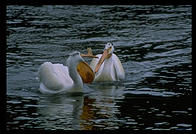 After returning to Yellowstone Canyon, drawn by a half-kept promise of
sunshine, I drove up the Yellowstone River toward Lake Yellowstone. A
large collection of white pelicans had gathered on an island in the
middle of this 100-yard-wide river. These birds have long orange/yellow
bills, but in mating season the top of the bill is crowned with a bizarre
flat square sexual appliance.
Whatever they do with this is probably illegal in Massachusetts, but I
didn't see them use it.
After returning to Yellowstone Canyon, drawn by a half-kept promise of
sunshine, I drove up the Yellowstone River toward Lake Yellowstone. A
large collection of white pelicans had gathered on an island in the
middle of this 100-yard-wide river. These birds have long orange/yellow
bills, but in mating season the top of the bill is crowned with a bizarre
flat square sexual appliance.
Whatever they do with this is probably illegal in Massachusetts, but I
didn't see them use it.
Lake Yellowstone is a large medium-blue lake surrounded by snow-capped
peaks--imagine Lake Tahoe with geysers on the beaches. At lunch, I
introduced myself to Arleigh, a mysterious Coloradan.
"Be careful with all that silver jewelry around the sulfur fumes. In
New Zealand's thermal areas, they say it will tarnish."
"Thanks."
I decided to turn on the charm: "Say, you are wearing a lot of
silver. If your teeth were black, you could join a primitive tribe."
Arleigh and I swapped "who can get dumped in the cruelest possible
manner" stories. I won easily by quoting a German girl who greeted me
after an 18-hour international flight: "Philip, there are things about
you that I don't like and I don't love you enough to overlook them. I
made up my mind a few weeks ago, but I still wanted you to take time off
work and come see me. I didn't want you to be able to say about me that
I didn't have the courage to face you."
Arleigh was on a solo photo-safari through the West, trying to figure
out whether to attend graduate school.
"My basic problem is that I'm good at too many things and therefore
can't choose any one thing."
I arrived at
Old Faithful
just in time for the eruption of the eponymous geyser. Two friendly
happy couples waited alongside me and asked me why I was using the
Rollei.
"Because the negatives are four times the size of a 35mm negative.
Where are you from? Germany?"
"No!!! We're Dutch!" they exclaimed in horror.
"Sorry. How long are you staying in Yellowstone?" I asked, hoping to
paper over my faux pas.
"Only one afternoon. We're on a three-week New York to San Francisco
bus tour, and we have to get to Salt Lake City tonight. It is our first
trip to the U.S. and we want to see everything."
"That's absurd! You can't even see California in three weeks."
"Americans see Europe in three days," they retorted. It sounded
vaguely logical at the time, but later I wondered what it would prove
even if it were true.
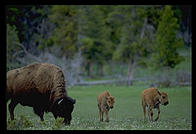
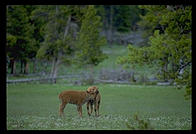
Circling back towards Roosevelt, I came upon a group of bison with two
playful calves. As I photographed the two calves nuzzling in the
fading light, Arleigh stopped to say, "Hi." We agreed to meet the next
night at her campground. Driving on a road cut through high
mountains, past waterfalls, and through lovely meadows would ordinarily
be enough to ensure human felicity. Yellowstone National Park doesn't
stop there, but offers up wildlife with practically every mile of its
enormous loop road. I yielded several times to coyote and once to a
majestic bull moose.
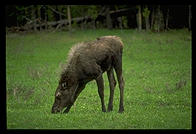 Thursday, June 10
Thursday, June 10
After a day of photography and chatting with tourists, I rolled into
Norris campground under a beautiful blue sky to find a campsite just two
"doors" down from Arleigh. My next-door neighbors were Tom, a muscular
fellow from Maine, his wife Pam, still sporting her thick Boston accent,
and their beautiful Samoyed dog Kashi.
"We gave up our apartment in Portland and just hit the road. Pam is a
Traveling Nurse and I'm a respiratory therapist so I can usually pick up
day jobs in the same hospital. Whenever we run short on cash, Pam calls
up Traveling Nurses and finds out what's available."
Kashi was a real sweetheart, and I played with him for about an hour.
The thumping sound made by slapping his powerful chest and the feel of
his rough guard hair on my cheek evoked George to the point that I
almost cried. I thought about how the trip might have been with George
and felt a physical ache.
Yellowstone National Park has one legal mountain bike trail, an old 4WD
road just north of Old Faithful. It winds through a beautiful flat
valley studded with dead trees standing up amid tall grass and steaming
pools. There wasn't a soul in sight, which suited me fine because I was
trying out my new "clipless" pedals. These essentially weld the rider
to the bike, which is great for maximum pedaling efficiency.
Unfortunately, I hadn't figured out how to get out of them. People in
Minneapolis had laughed as I screamed and fell halfway over at each red
light.
Sixty-degree cold, a gray sky, and a savage headwind made the first six
miles hurt a bit, but I forgot my fatigue when I encountered a large
herd of bison. They were probably accustomed to cars, but a mountain
bike excited their curiosity and they began to follow me. I recalled
the Park Service's graphic sign of a person being gored by a bison and
remembered the brochure given to every park visitor: "Bison injure more
people than any other animal in the park. They can run 30 miles per
hour."
I also remembered that my mountain bike's gears allowed me to go only 25
miles per hour. On pavement.
Fortunately, no heroics were necessary to get back to the car--Arleigh
informed me later that most bovine creatures are near-sighted and hence
tend to approach unfamiliar objects just to get a better look--and an
extravagant meal at the Old Faithful Inn felt like Heaven compared with
the thunderstorm that had gathered outside.
It was just getting dark when I met Arleigh at the campground. We went
across the street to the extensive Norris Geyser Basin, a treeless
moonscape of blue, white, and yellow. We sat alone at midnight just a
few steps from the Echinus geyser as it sent water 100' and steam 500'
into the air for over an hour. Sitting 100' from Old Faithful in the
daytime seemed like a Disneyland attraction compared with this haunting
primeval experience of Nature's power.
June 11
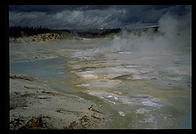 Arleigh and I photographed the Porcelain Basin moonscape under
overcast skies and then moved out of the park to the west. One elk
and some distant bison stopped all of the cars coming into the park,
but people leaving the park were jaded and sped by at 50 mph.
Arleigh and I photographed the Porcelain Basin moonscape under
overcast skies and then moved out of the park to the west. One elk
and some distant bison stopped all of the cars coming into the park,
but people leaving the park were jaded and sped by at 50 mph.
Yuppie culture has penetrated deep into the mountains, at least to
judge by the hip clientele of the
West Yellowstone, Montana,
bookstore/espresso bar. Arleigh didn't want to spend big bucks at the
yuppie pizzeria so we ducked into a white trash cafe. My sandwich
came drenched in mayonnaise, which nauseates me. I apologized to the
waitress for not specifying "no mayonnaise," and she took it back to
the kitchen shaking her head just a bit.
"I can't believe you forgot to ask for no mayonnaise!" exclaimed Arleigh contemptuously. "If you don't like mayonnaise, how could you possibly forget?"
A bit later, Arleigh proposed that we travel together for awhile.
"To tell you the truth, Arleigh, I like to nurse the illusion that women
find me attractive. It depresses me to spend too much time with a woman
who I'm sure turns up her nose at me, even if I'm not that interested in
her. Usually women don't say anything that punctures my little balloon
of desirability, and I can be happy thinking they find me attractive
while they are perhaps thinking the opposite--this could go on for years
with some women. However, the contempt you expressed for me over the
mayonnaise incident forced me to realize that you wouldn't find me
attractive even if I were the last man on Earth."
"You are the most insecure man I've ever met."
A fairly scenic drive, studded with a bull moose and thundershowers,
brought me to
Butte, Montana.
Once one of the richest towns in America, the population has been
shrinking since the copper mines closed. Downtown bears the mark of
easy fortunes and is strewn with once-fancy shops and magnificent bank
buildings. At the Berkeley Pit overlook a tape-recorded voice told me
about the tons of copper (plus 700 million oz. of silver and 3 million
oz. of gold) that had been taken out of this 1800' deep hole. The pit
is now filling up with water, reversing the effects of years of drainage
and threatening to turn half the town back into a swamp. Furthermore,
the tailings contain enough arsenic and cyanide to make this one of the
most notorious Superfund sites. A livable house in town costs between
$6000 and $18,000. All of the town's museums are free, everyone is
helpful and nice, and it would have been lovely if I hadn't gotten the
impression that people were almost desperate to attract visitors and new
residents.
I ate an inexpensive Mexican dinner consumed amidst the faded splendor
of what was once a marble bank lobby. I talked to a 30ish guy who was
living modestly in Butte working 50 hours/week at WalMart.
"You wouldn't see that in Boston," I remarked. "You'd have to work 80
hours/week at a job like that to have even a chance of living decently.
It would hardly be worth your while to slave away just so that you could
live as well as people on welfare."
"That's why we don't have homeless people in Butte," he concluded.
Listening to an AM station from San Francisco, I pressed on to a youth
hostel in
Missoula.
The program seemed to fulfill every Easterner's
stereotype about San Francisco; it was an interview with a bartender
who'd written a book about how to meet women. The best line he'd
overheard was this:
"You look just like my first wife."
"Really? How many wives have you had?"
"None. You're the first."
Saturday, June 12
Missoula is a bizarre cross between Western misfit loner culture and
Cambridge/Berkeley granola culture. The University of Montana dominates
the town's mountainside and sets a tone different from that of Billings
or Butte. It is tough to say why, but Missoula beguiles and traps
people despite one local's observation that it was an "easy place to get
by, but a hard place to get ahead." I planned to stay one night and
ended up staying three. Missoula helped me understand John Steinbeck:
"Montana seems to me to be what a small boy would think Texas is like
from hearing Texans."
The owner of the film lab was a grizzled Canadian who came here in `68.
He does E6 in two hours and dispenses philosophy at the same time.
"I've lived just about all over the U.S. and don't have any interest in
the landscape anymore. I don't understand why people spend so much time
and effort photographing it. In fact, even the local scenery doesn't do
much for me. I'd be just as happy if I never saw a picture of
Yellowstone or Glacier."
How come he stayed?
"Well, it beats living in the East. All I can say is that people in New
York are obviously easily amused if they were willing to pay $50 for a
shallow Broadway show and then spend three hours discussing its fine
points."
Not all the natives are blind to the charms of the local landscape.
Lynn, raised in Kentucky, came here for a summer photo workshop and stayed
to pursue dual careers as a massage therapist and fine-art
photographer.
"It is a great place for immigrants because the locals are so lacking
in skills. A lot of the people doing massage here don't have any
formal training at all. Unfortunately, a lot of folks here,
especially men, are prone to excessive drinking. Social customs are
pretty different from what I was used to in Kentucky also. People
here don't seem to invite each other over for dinners or whatever."
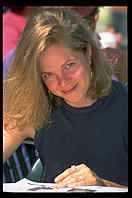 Walking into the local espresso/fresh-squeezed juice bar, I attempted to
hold the door for a 25ish woman and she utterly refused to precede me,
giving me a look rather akin to what Clarence Thomas might expect
walking into the lesbian/feminist bookstore in Cambridge. Fortunately,
people inside were friendlier, and I hadn't looked at the full tables for
more than 10 seconds before Dawn, a wistful 22-year-old
super-Midwesterner-but-dying-to-live-the-adventurous-Western-life,
invited me to join her.
Walking into the local espresso/fresh-squeezed juice bar, I attempted to
hold the door for a 25ish woman and she utterly refused to precede me,
giving me a look rather akin to what Clarence Thomas might expect
walking into the lesbian/feminist bookstore in Cambridge. Fortunately,
people inside were friendlier, and I hadn't looked at the full tables for
more than 10 seconds before Dawn, a wistful 22-year-old
super-Midwesterner-but-dying-to-live-the-adventurous-Western-life,
invited me to join her.
Dawn had dropped out of Indiana University and moved to Cleveland
because her ex-boyfriend wanted to kill her (Credentialist Society
footnote: her Mom was much more upset that she might not finish school
than she was concerned about her safety). Dawn was the kind of beauty
that men build worlds around with the assumption that they can bend her
to their will. When they discover that she has a will of her own, their
world falls to pieces and hence she is a natural heartbreaker.
"I just hated the Midwest because it was so boring. I freaked my family
out by moving here with no job in sight. My boyfriend and I just drove
out here one day. He gets on my nerves now--we're sharing a two-bedroom
apartment but not as boyfriend/girlfriend anymore."
Why didn't she move out? Wasn't it a bit painful for both of them?
"We still have nearly a year to go on the lease."
In the evening I drove out to the national forest to camp by a stream.
No fee, no people, no noise but the gurgling of the stream.
Sunday, June 13
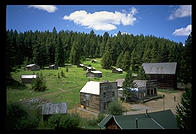 A perfect blue sky and reasonably warm day! After a long drive up a winding narrow dirt road that passes through beautiful high mountains, I reached the ghost town of Garnet.
This was a gold mining town inhabited periodically between 1860 and 1940. The few tourists were greeted by Frank Fitzgerald, who was born here in 1912.
A perfect blue sky and reasonably warm day! After a long drive up a winding narrow dirt road that passes through beautiful high mountains, I reached the ghost town of Garnet.
This was a gold mining town inhabited periodically between 1860 and 1940. The few tourists were greeted by Frank Fitzgerald, who was born here in 1912.
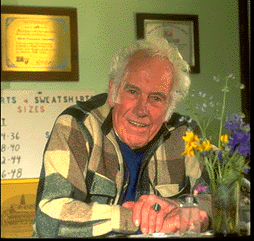
 "My father owned one of Garnet's 13 saloons. The saloon and a lot of the rest of the town burned down, though, and everyone moved away. I went into the Navy for four years during World War II. What I really loved were books, so I studied English Literature at University of Montana under the G.I. Bill."
"My father owned one of Garnet's 13 saloons. The saloon and a lot of the rest of the town burned down, though, and everyone moved away. I went into the Navy for four years during World War II. What I really loved were books, so I studied English Literature at University of Montana under the G.I. Bill."
Was that good for a job back in those days?
"Oh sure. I taught high school English for years in Idaho and eventually became a librarian. That was the most fun."
What about now?
"I live up here in the ghost town during the summers and down in a village 10 miles from here in the winter. I've got a telephone there."
I told Frank about my plans to visit Alaska.
"I always wanted to go there but never managed it somehow. You're really doing it the right way. I'd never go except by ship or car; you just can't see anything from an airplane."
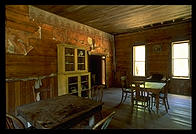
June 14
Anxious to make the most of Nice Day #3 of this trip, I went mountain
biking in the distressingly named Rattlesnake Wilderness area, which
starts just a few miles from downtown Missoula. I saw a few snakes, but
wasn't too worried because I figured they were more likely to bite the
bike than me. I rode about 16 miles up a stream into a valley
surrounded by steep forested mountains. At a charming waterfall, I
stopped to chat with Lea, a Utah native who'd moved here from Atlantic
City.
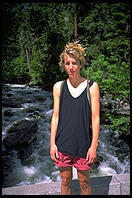
"I just felt at home in the West. A lot of Easterners have trouble
adapting socially here because they don't understand the subtleties of
our culture. There is also some discrimination against immigrants
from other parts of the country. One of my best friends is a short
Italian-American woman from Boston. She hardly has any friends and
feels that her coworkers discriminate against her."
What brought Lea to the woods?
"Stories. I work in a bookstore and think about stories when I hike.
When I get to a nice place to stop, I sit down and write for awhile."
I met Dawn again at a funky riverside coffeehouse in downtown Missoula.
She scanned the paper for organizations looking for volunteer work.
"I'd like to do something to help other women. Maybe an abortion
counseling or advocacy group."
She told me the real story of her crazy obsessed lover back in Indiana.
She'd been with him not because she liked him but because of his money
and friends, especially his connections with a local rock star. When
even his appurtenances weren't enough to hold her any longer, he
kidnapped her and imprisoned her in an out-of-town motel room.
"He'd bugged my apartment and played me a bunch of tapes, demanding to
know who were the people talking. The sound was so bad, I couldn't even
figure out what they were saying. He was paranoid and kept drinking.
`Go to sleep if you want,' he'd say, `I won't touch you.' `Yeah,
right,' I said.
"The odd thing was that he was most suspicious of Bill, who lived
upstairs from me. Bill was just a friend at the time, but he's the guy I
came out here with.
"I managed to escape once, but he chased after me and caught me. I was
screaming but nobody came to help me. Then, after 12 hours, he just
drove me home with no explanation."
 Chapter V: Marriage, Montana, Mountains
Chapter V: Marriage, Montana, Mountains
 Table of Contents
Table of Contents
philg@mit.edu
Related Links
Add a comment | Add a link
 I was just getting to like Bismarck when it was time to leave to follow the
trail of Lewis and Clark (1806) up the Missouri River's mini-canyon on
the Great Plains.
With the right light, the grasslands and hills are haunting, and even
passing coal mines and power plants were surprisingly clean and appealing.
The Missouri is the boundary between the flat eastern half of the state
and the hilly western half. Bob, a weathered Pentecostal auctioneer,
explained this to me: "The Wisconsin Ice scraped over only the eastern
half of North Dakota. The Missouri River was actually formed by water
melting off the top of the glacier and hence gives a good indication of
the extent of the ice sheet."
I was just getting to like Bismarck when it was time to leave to follow the
trail of Lewis and Clark (1806) up the Missouri River's mini-canyon on
the Great Plains.
With the right light, the grasslands and hills are haunting, and even
passing coal mines and power plants were surprisingly clean and appealing.
The Missouri is the boundary between the flat eastern half of the state
and the hilly western half. Bob, a weathered Pentecostal auctioneer,
explained this to me: "The Wisconsin Ice scraped over only the eastern
half of North Dakota. The Missouri River was actually formed by water
melting off the top of the glacier and hence gives a good indication of
the extent of the ice sheet."
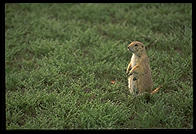







 We continued upstream on the rim of Yellowstone Canyon until we came to
the magnificent pair of waterfalls at its front. On my first trip to
the West, I'd found this canyon much more beautiful than the Grand
Canyon and would have described it as Kipling did. Under gray skies, it
was still beautiful, but the magic was gone.
We continued upstream on the rim of Yellowstone Canyon until we came to
the magnificent pair of waterfalls at its front. On my first trip to
the West, I'd found this canyon much more beautiful than the Grand
Canyon and would have described it as Kipling did. Under gray skies, it
was still beautiful, but the magic was gone.









